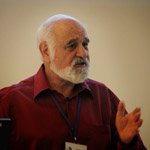Welcome to the Convergent Science Network Podcast!
During the BCBT Summerschools (2010, 2011, 2012, 2013, 2014) hosting professors Paul Verschure and Tony Prescott interviewed several speakers after their lectures. Interviews are also conducted on other occasions with various scientist in converging fields.
About the hosts: Paul Verschure is ICREA Professor at SPECS, Universitat Pompeu Fabra, Barcelona; Tony Prescott is Professor of Cognitive Neuroscience, University of Sheffield.
The Convergent Science Network of biomimetic and biohybrid systems (CSN, www.csnetwork.eu) is a coordination action for the development of future real-world technologies. CSN is supported through the Future and Emerging Technology programs (FET) of the Information and Communication Technologies (ICT) work programme of Framework Programme 7 of the European Commission.
Audio (post-)production: Sytse Wierenga. Podcast site: Alberto Betella.
Thoughts, discussions, and achievements in neurobiology, biomimetic and biohybrid systems
We can learn a lot from brains and bodies when making machines and robots. But reversely, building complex machine systems can also give ideas about how brains and bodies have implemented their functioning over the evolution of ages. This podcast discusses various themes and aspects in-between robotics, neuroscience, cognitive science, artificial intelligence, biology, and technology.
Interview with Michael Arbib
04-04-2018

This post-lecture interview was conducted during the BCBT Summerschool held at the Universitat Pompeu Fabra, Barcelona, september 2010.
During his long and distinguished career, Michael Arbib (University of Southern California, USA) studied a wide variety of aspects that have to do with the relation between vision, and action. One aspect of his work focuses on the theory of perceptual schemas, a theoretical model to address what goes in between the psychological level of action and behavior in a world, and the lower levels of neural processing. With Tony Prescott and Paul Veschure he discusses the important limitations computational modeling has with respect to how behavior is effectively implemented in neuronal structures. Another key turn in his research came with the discovery of mirror neurons, which are neurons that fire not only in relation to action of the animal itself, but also to the perception of the performance of that action by other animals. From research on the localization of mirror neuron systems in human brains Arbib c.s. found, that our current language system has probably evolved from brain areas that generated and controlled gestures. This calls to view what we now call human language from a much larger perspective than one of speech or writing alone. In the view of Arbib it also calls to apply a framework of study that focuses not only on the processing of neurons in an isolated individual, but also to the embedding of it in social and cultural structures of the present, and the past of evolution.
About the lecturer
Michael Arbib is Professor in Computer Science, Neurobiology, Physiology, Biomedical Engineering, Electrical Engineering, and Psychology at the University of Southern California, Fletcher Jones Professor of Computer Science, and director of the USC Brain Project. The core of Michael Arbib's work is expressed in the title of his first book, Brains, Machines and Mathematics (McGraw-Hill, 1964). He has written or edited more than 40 books on these topics since. His career is based on the argument that we can learn much about machines from studying brains, and much about brains from studying machines. He has thus always worked for an interdisciplinary environment in which computer scientists and engineers can talk to neuroscientists and cognitive scientists.
Categories | Brain evolution and development | Cognition |
Filetype: MP3 - Size: 35.28MB - Duration: 30:42 m (160 kbps 44100 Hz)
Tweet


